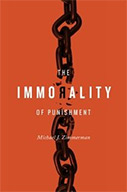The Immorality of Punishment

Author: Michael J. Zimmerman
Publisher: Peterborough, ONT.; Buffalo, NY: Broadview Press, 2011. 183p.
Reviewer: Kurt Fowler | November 2013
The authority to punish is perhaps the most crucial aspect of the Criminal Justice System, and it is this principle that Michael J. Zimmerman argues against in The Immorality of Punishment. Zimmerman provides a much needed examination of the construct of punishment in the Criminal Justice System and the rationale that undergirds it. According to the author, the act of punishment and the institutions that carry it out are morally misguided and lack the authority and ability to recompense any crime that is committed. A bold thesis to say the least, Zimmerman prefaces his argument with a thorough examination of the logical framework that surrounds our justice system — examining the concepts of guilt and punishment to ensure his audience can follow his discourse.
The Immorality of Punishment represents not just a condemning of the current practice of punishing people who commit crimes, but the actual concept of institutional punishment itself. Each section of the book examines a different aspect of Zimmerman’s argument inexorably leading to the final chapter where his thesis is simultaneously proven and reaffirmed, given the conclusions he has presented. Zimmerman starts with a firm definition of punishment and then continues to the rationale for inflicting that punishment on someone. Each chapter builds upon the points and definitions provided in previous chapters, building to Zimmerman’s inescapable thesis. This is a convincing way to present an argument, and the author makes an earnest attempt to keep the reader engaged by including a summary of each chapter to keep stragglers from wandering off the rhetorical path.
Each section of The Immorality of Punishment is a building block that strengthens Zimmerman’s arguments, but it is his chapter on retribution that shines above the rest. Coming after an examination of the multiple purposes that drive the punishment of those found guilty of criminal behavior, Zimmerman examines the nebulous nature of the concept of retribution, lamenting “it is not at all clear, to me at least, just who is supposed to be repaying what to whom, let alone why punishment is supposed to be a suitable currency.” Zimmerman goes so far as to qualify differing retributive views into “strong” and “weak” categories, which allow the reader to come to their own conclusions on the value of either of these closely related but sometimes-pedantic definitions.
Though Zimmerman is offering a compelling Socratic case for the immorality of institutional punishment, an unfortunate downside to the book is that he provides mostly fictional examples to further illustrate his points in lieu of real world instances. The current state of the Criminal Justice System lends itself to no dearth of compelling stories of people being punished in dubious or outright immoral circumstances and some additional compelling narratives could have given the book a sense of urgency desperately needed for such an academic argument. The Immorality of Punishment is both a valuable tool for the philosophical criminal justice community that resides in the halls of academia and an informative read for those interested in investigating the rationale that sustains the ever moving mechanism of the justice system.
Kurt Fowler, Ph.D Student, Rutgers School of Criminal Justice


